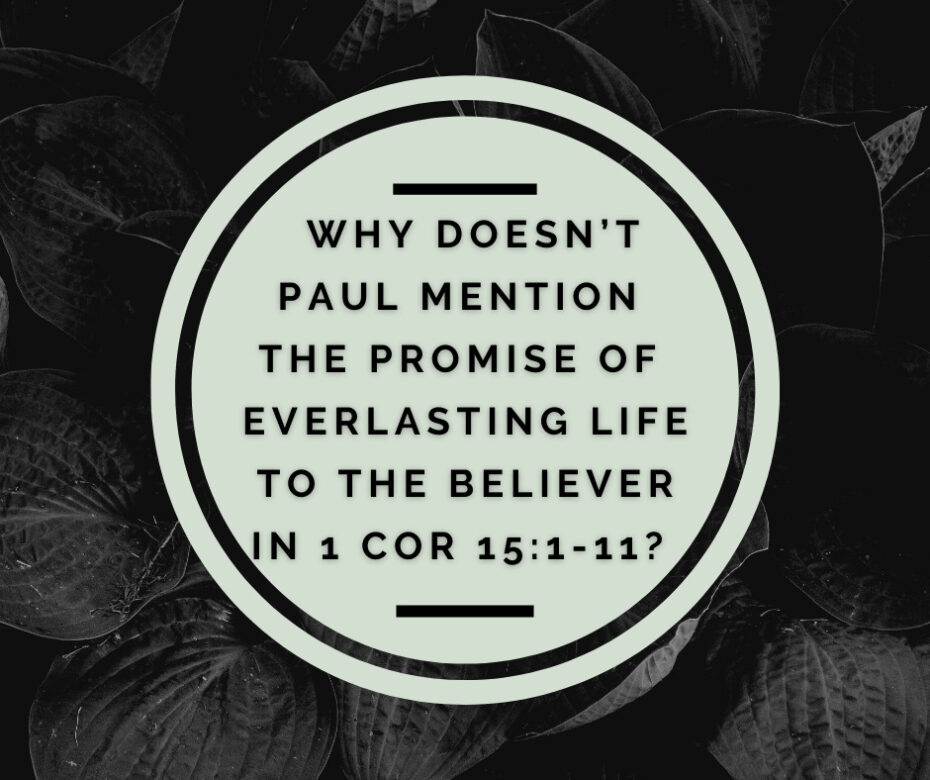A reader expresses his agreement with our understanding of what it means to believe in Christ, and then he asks how we explain 1 Cor 15:1-11:
So, I was reading a few blog posts from the GES about what it means to believe in Christ. However, I actually had already known (more or less) of what your stance about this question is (being that I like your ministry, listen to your podcast, read your blogs and whatnot, etc.). And, as it is, through reading John, I too agree that “belief in Christ” (the belief necessary for eternal life) is the belief that He guarantees everlasting life, not the belief in Christ’s works.
Anyway, the actual reason I was reading the blogs in the first place is because I was wondering how our position on salvific belief would be defended in the reading of 1 Corinthians 15—vv. 1-4 specifically. One would imagine that whatever was “of first importance” (v.2) to Paul would be whatever can trigger everlasting life in a person; nevertheless, Paul makes no mention of believing that Jesus guarantees eternal life. His emphasis is explicitly on believing the death, burial, and resurrection. So, how would you reconcile this passage with the belief that Jesus grants eternal life to those who belief just that?
I have written on 1 Cor 15:1-11 on several occasions. See a 2019 blog on believing in vain here, a 2008 Grace in Focus Magazine article dealing with things that people add and take away from 1 Cor 15:1-11 to try to make it evangelistic, here, and a 2020 blog on the need to hold fast, here.
I will summarize what I say in those articles.
First, the Gospel of John was written long after the birth of the Church to tell people in the church age what they must do be saved (John 20:31). Nicodemus (John 3) and the woman at the well (John 4) both came to faith, yet there is no indication that the Lord preached the cross and resurrection to either. (He did allude to the cross in John 3:14-15, but even the disciples did not understand this as a reference to Jesus’ dying. Compare Matt 16:21-23. The eleven disciples were born again years before they believed in Jesus’ death and resurrection.)
Second, 1 Corinthians 15 is the great resurrection chapter. Paul is not evangelizing in this chapter. On this side of the birth of the Church, people come to faith in Christ for everlasting life by learning of His death and resurrection for us. Yet that is not the point of 1 Cor 15:1-11. Paul is calling the Corinthians to ongoing sanctification. He is writing to believers in Corinth on the importance of Jesus’ resurrection in their daily walks.
Third, vv 1-11 serve to introduce the chapter. Paul’s point in these verses is that the believers in Corinth can be spiritually healthy by holding fast to the good news that Paul preached to them concerning Jesus’ death, burial, and resurrection. The salvation mentioned in 1 Cor 15:2 is not a past completed event as in Eph 2:8-9. Instead, it is a present tense ongoing salvation that is contingent on holding fast to the gospel Paul preached. That salvation is being spiritually healthy. Compare 1 Cor 3:15; 5:5.
Fourth, the point of 1 Cor 15:1-11 is clearly found in Paul’s call to the believers in Corinth to hold fast to the truth of the gospel (1 Cor 15:2). It is possible that a believer will stop living at the foot of the cross and the entrance to the empty tomb. We must hold fast if we are to remain spiritually healthy.
Fifth, those who seek to make 1 Cor 15:1-11 into an evangelistic text have to do a lot of adding and taking away. They have to add the promise of everlasting life, which is not mentioned in this passage, as the reader points out in his question. They have to add that the moment one believes in Jesus he receives that life. The passage says nothing about what we receive at the moment we first believe. They have to take away the requirement that one hold fast to the gospel in order to stay saved. This passage does not contain what we find when Paul discusses the message of life. Compare Acts 16:31; Eph 2:8-9; 1 Tim 1:16.


